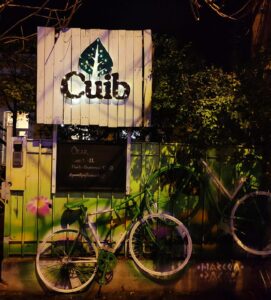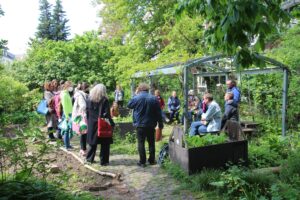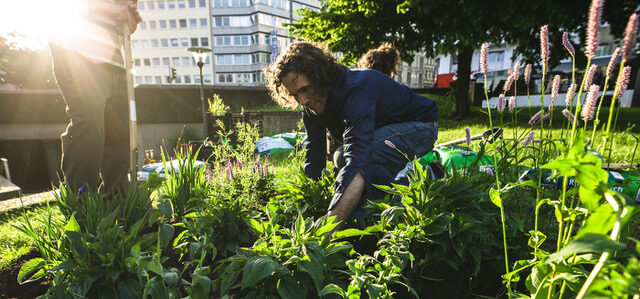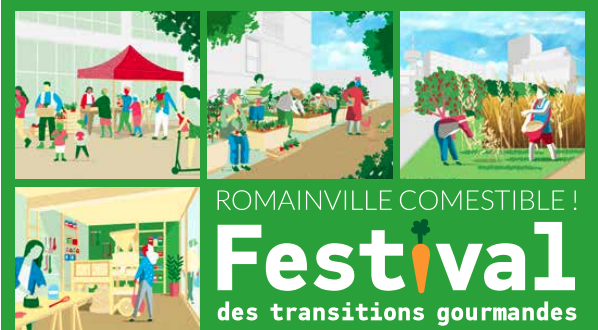Meet the grassroots organisations around the world that are driving positive social and environmental change in their cities
Four prize winners have been announced for the Edible Cities Network Awards, a programme celebrating urban food initiatives around the world that are creating meaningful change in their local food systems. Winners are awarded a funded place at the Edible Cities Network Conference in Barcelona in March 2023, where their projects will be presented and they will get the chance to connect with other sustainability pioneers. The winners were chosen by a jury of food systems and green city practitioners, as well as through a peer-to-peer voting process. Applications were received from 18 different countries across 4 continents.
Winner of Most Innovative Individual Action – CUIB, Romania
Operating as a plant-based bistro and a community-space, CUIB is a hub for sustainability in Romania’s second-biggest city, Iași. CUIB takes a holistic approach to sustainability, focussing upon nature, society, and economy. The hub operates a membership system that allows for a solidarity-model approach, its menu is currently 90% locally-grown menu, they use saved food wherever they can, food waste is turned into compost for growing new crops, free meals are offered to vulnerable communities, and it is making plans to go fully zero-waste.

Winner of Most Innovative Individual Action (Local Hero) – Trees de Bruyne, Belgium
Trees de Bruyne founded the NGO ‘bark.today’ at the beginning of 2022. With her Jummy Jungle in the town center of Aalst in Belgium, she was at the heart of helping it grow into a thriving food forest that has over 360 participants. ‘Nature-connectedness’ drives the project, which includes mindfulness, storytelling, creative endeavours, and nature-based education within the food forest, creating new connections and long-lasting knowledge about urban food within the city of Aalst and across Belgium.

Winner of Most Innovative Social Engagement Process – The Centre of the Earth, Greece
‘The Centre of the Earth’ is an urban farm that has been operating for over 10 years in Athens. Its goal is local mitigation and adaptation to climate change through sustainable food production, taking an approach that focusses upon sharing agroecological and organic growing skills – with a particular focus on catering to vulnerable groups. Activities are co-designed and adjusted in conversation with participants, and to date over 70,000 adults and 50,000 children have participated in educational activities on the farm.
Winner of Best overall Edible City Approach – Edible City Cologne, Germany
Edible City Cologne is a citywide strategy working to make Cologne more ‘edible’. Its basis is an Edible City Action Plan which sets out how the city can improve its food system. This developed as a participatory project that became part of the city’s political agenda, and includes a programme covering edible public green spaces, community gardens, urban orchards, and more. As well as public spaces, they also focus upon bringing gardens into schools, housing associations, and companies.
Speaking of her experience on the expert panel, Vic Borrill from the UK’s Brighton & Hove Food Partnership commented that: ‘Sustainability is about more than just about ecology – it’s about making sure that you’re giving people equal opportunities to participate, and looking at ways to make your model financially sustainable so that it can continue to make long-term impact. The winners we have chosen for this year’s awards are all examples of holistic approaches to sustainability, and we’re delighted to celebrate them internationally’
Laura Martinez, from the Norwegian think-and-do-tank Nabolagshager, added ‘given that 56% of the world’s population currently lives in cities, and an estimated 7 out of 10 people worldwide will be living in cities by 2050, there is a pressing need to make our cities more sustainable, livable and healthier. Creating spaces for food growing and food production is an important step towards this goal, and this year’s award-winners play their part in doing that’.
To find out more about the work of the Edible Cities Network, or to register to attend the annual conference in March, visit the Edible Cities Network website at https://www.edicitnet.com/.

About the Edible Cities Network
The Edible Cities Network is a global network of individuals and organisations, working together to make our cities more socially and environmentally resilient through urban food system innovation – everything that makes our cities more ‘edible’. EdiCitNet has received funding from the European Union’s Horizon 2020 research and innovation programme under grant agreement No. 776665
The Edible Cities Network project is coordinated by Humboldt Universität zu Berlin in Berlin, Germany. The core of the project is a network of urban communities in 11 cities across Europe, Africa, Latin America and East Asia, supported by local residents, city administrations, NGOs, businesses and research organisations across the globe.
For further information about the Edible Cities Network worldwide, contact: [email protected]






